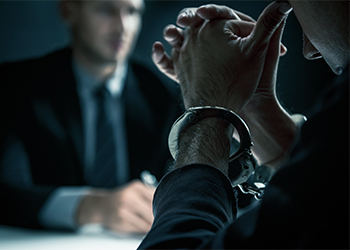Can You Be Convicted Without Physical Evidence in a Criminal Case?
April 2, 2025
 If you've been charged with a crime, you may wonder whether it's possible to be convicted without physical evidence.
If you've been charged with a crime, you may wonder whether it's possible to be convicted without physical evidence.
As a criminal defense attorney at The Hardin Law Firm in St. Louis, Missouri, I know how unsettling this question can be. However, it's important to know that physical evidence isn't always necessary for a conviction.
In many cases, factors like motive, opportunity, and witness testimony can be enough to secure a conviction. Circumstantial evidence, like being near the crime scene, or even a defendant's own statements, can also play a critical role in a case. While the absence of physical evidence complicates things, it doesn’t make a conviction impossible.
How Important Is Physical Evidence in a Criminal Case?
In criminal cases, physical evidence plays a critical role in establishing facts and supporting or refuting allegations. Physical evidence includes things like fingerprints, DNA samples, weapons, drugs, or any tangible objects that can link a suspect to a crime. When physical evidence is available, it can be incredibly powerful in persuading a jury to render a guilty or not guilty verdict.
However, there are instances where physical evidence might not exist or may be insufficient to prove guilt. Despite this, convictions can still happen, which raises an important question: How does this happen?
Types of Evidence in Criminal Cases
While physical evidence is often key, it's far from the only type of evidence that can be used in a criminal defense case. Understanding the different forms of evidence and their importance can shed light on how a case might proceed without physical evidence.
Direct Evidence
Direct evidence is evidence that directly links the defendant to the crime. This can include:
Eyewitness testimony: If someone saw the defendant committing the crime, their testimony can serve as direct evidence.
Confessions: A defendant's own admission or statement confessing to the crime can serve as powerful direct evidence.
Direct evidence is compelling because it directly proves the defendant's involvement in the crime without needing further explanation or circumstantial links. However, even without physical evidence, direct evidence can sometimes be all that’s needed for a conviction.
Circumstantial Evidence
Circumstantial evidence refers to evidence that doesn’t directly link the defendant to the crime but suggests they may have committed it. Circumstantial evidence is often the driving force in cases that lack physical evidence. Examples include:
Motive: If the defendant had a clear reason to commit the crime, this could suggest their involvement.
Opportunity: If the defendant was in the vicinity of the crime when it occurred, this could strengthen the case against them.
Behavioral evidence: Actions taken before or after the crime that suggest guilt, such as fleeing the scene or trying to cover up evidence.
While circumstantial evidence is not as direct as physical evidence, it can be used to build a strong case, especially if several pieces of circumstantial evidence are presented together. In fact, many criminal cases rely on circumstantial evidence when physical evidence is absent.
Testimony and Witness Statements
Testimonies from witnesses or victims are frequently used in criminal trials. A victim's testimony about the events leading up to the crime or a witness's statement about what they saw can be pivotal. In some cases, a single witness's account can carry enough weight to sway a jury, even without physical evidence to corroborate their story.
A suspect’s own statements or actions can also be used in court. For example, if a defendant says something incriminating to the police or confesses to a bystander, those statements can be introduced as evidence.
Can a Defendant Be Convicted Without Physical Evidence?
Yes, a defendant can be convicted even if there’s no physical evidence linking them to the crime. In cases where physical evidence is unavailable or inconclusive, it’s often other types of evidence, such as circumstantial evidence or witness testimony, that’ll make or break the case.
Here are a few ways a conviction might occur without physical evidence:
Witness testimony: In some cases, eyewitnesses or even expert witnesses can testify to the facts of the case. Their accounts may lead the jury to believe that the defendant is guilty, even if there’s no physical evidence supporting the claim.
Confessions and admissions: A confession or statement made by the defendant admitting guilt can sometimes lead to a conviction without any physical evidence. Confessions, however, can also be challenged if there’s reason to believe they were coerced or false.
Circumstantial evidence: Circumstantial evidence, like motive or opportunity, can play a large role in securing a conviction. For instance, if a defendant is caught near the crime scene around the time it occurred, this can be considered circumstantial evidence.
Inferences from the defendant's behavior: How a defendant behaves before, during, or after the crime can lead to an inference of guilt. This might include fleeing the scene, destroying evidence, or showing signs of consciousness of guilt.
Ultimately, the strength of the case will depend on how convincingly the evidence, whether physical or otherwise, supports the prosecution's argument.
Proving Guilt Beyond a Reasonable Doubt Without Physical Evidence
In criminal cases, the prosecution must prove the defendant’s guilt beyond a reasonable doubt. This standard of proof is high because the consequences of a conviction are severe.
While physical evidence often plays a key role in meeting this standard, it’s not the only way to establish guilt. For example, a case can still meet the burden of proof even if there’s no physical evidence if there’s enough strong circumstantial evidence or reliable testimony to convince the jury that the defendant is guilty.
For instance, if a defendant was seen fleeing the scene of a crime, had a motive, and admitted to being near the crime scene at the time, this could all add up to enough evidence to prove guilt beyond a reasonable doubt. Without physical evidence, it’s the prosecutor’s job to link the defendant to the crime in other ways.
Challenges in Criminal Defense Without Physical Evidence
When physical evidence is lacking, defending a case becomes much more challenging for the criminal defense attorney. Without tangible proof to point to, a defense attorney may rely more heavily on:
Disputing the credibility of witnesses: This could involve highlighting contradictions in testimonies or proving that the witnesses have biases or ulterior motives.
Arguing for reasonable doubt: Even without physical evidence, a good defense attorney will work to show that the circumstantial evidence presented isn’t enough to prove guilt beyond a reasonable doubt.
Pointing out inconsistencies in the prosecution’s case: If there are gaps or contradictions in how the prosecution presents its case, the defense attorney will emphasize these flaws to weaken the argument for conviction.
Without physical evidence, a case may hinge on subtle details, but it’s still very possible for a defendant to be acquitted if the evidence does not support the prosecution’s case.
What Does This Mean for Your Case?
If you’ve been charged with a crime and are concerned about the lack of physical evidence, it’s essential to understand that a conviction isn’t guaranteed, but the prosecution still has ways to build a case. As someone who focuses on criminal defense, I, Steven Hardin, know how to identify weaknesses in the case against you, whether physical evidence is involved or not.
Without physical evidence, a criminal defense attorney must rely on alternative strategies such as challenging witness credibility, showing lack of motive, or pointing out flaws in the prosecution’s arguments. Regardless of the circumstances, it’s always important to have a lawyer on your side who can guide you through the intricacies of the trial and protect your rights.
Contact Me Today
If you're facing criminal charges and are concerned about a lack of physical evidence, it’s critical to speak with an experienced criminal defense lawyer. Call The Hardin Law Firm today for a consultation in St. Louis, Missouri, to learn more about how my firm can help you defend your rights and your future.
